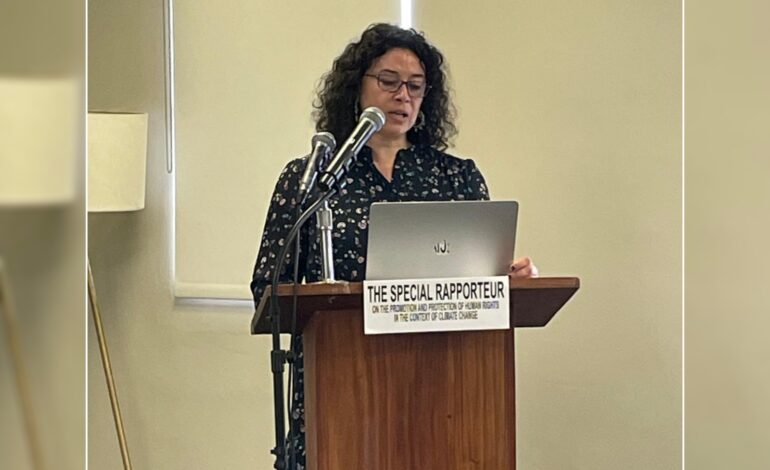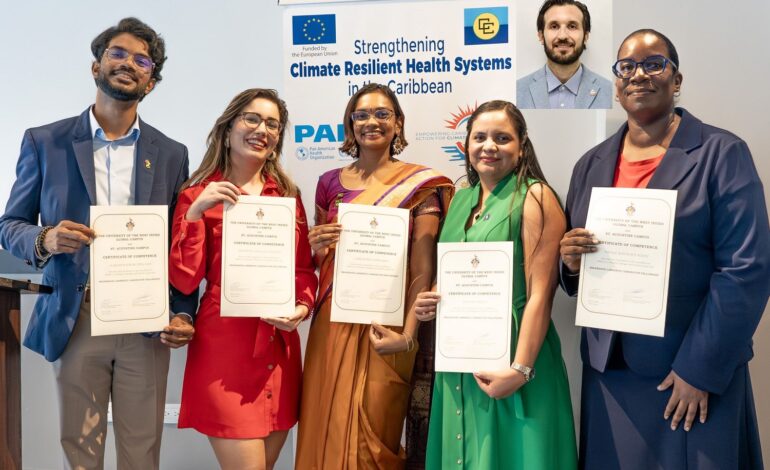
ROSEAU (14 May 2025) – Dominica’s efforts towards climate resilience have been remarkable, a UN expert said today, urging the Government and the international community to rely on the human rights approach to consolidate achievements, recognize local innovations and civil society’s contributions, and understand who was left behind from climate response and disaster recovery.
“Dominica has been able to secure a fast recovery after tropical storm Erika in 2015 and Hurricane Maria in 2017. These were catastrophic climate events,” Elisa Morgera, UN Special Rapporteur on climate change and human rights, said in a statement at end of her visit to Dominica, referring to loss of life, persistent mental health issues, destruction up to 90% of the housing stock and the loss of over 200% GDP.
“In the face of such dramatic human rights impacts of climate change to which Dominica does not contribute, high-emitting States should provide finance, as well as science and technology cooperation, to protect human rights, biodiversity and cultural heritage in proportion to their responsibility for the loss and damage experienced due to climate change in Dominica, without increasing its debt,” Morgera warned.
“Dominica’s ambition to become the world’s first climate resilient nation has made significant strides since 2017,” she added, noting cross-sectoral efforts to protect the rights to adequate housing, food, water, health and education, thanks to major investment of the national budget and the spirit of Koudmen – community cooperation, generosity and service.
“Shifting from top-down delivery towards transformative and collaborative approaches can further advance climate resilience,” Morgera said, “through access to information, public participation in decision-making, and the prevention of discriminatory practices in the distribution of recovery and resilience resources.”
“Participatory approaches also contribute to paying more attention to the essential role of biodiversity and cultural heritage in climate resilience,” the Special Rapporteur added. “This is particularly timely because of the expected expansion of tourism and imminent launch of land and marine spatial planning processes in the Nature Island of the Caribbean.”
The visit illuminated how transforming Dominica into a global resilience centre should rely on valuing and protecting the knowledge, practices and human rights of the Kalinago People – the largest remaining Indigenous peoples in the Caribbean islands, who have been the guardians of Dominica’s nature and water sources for centuries.
Small-scale fishers and farmers, divers and other individuals and communities who live in close connection with nature are also making significant contributions to environmental and socio-cultural sustainability, as are young people and NGOs. “But they are not recognised as trusted partners by the Government and face criticism for suggesting alternatives or mitigation measures,” the expert learnt during the visit.
“Dominica must urgently develop comprehensive legislation, through participatory processes, to protect human rights as part of climate resilience, including the rights of environmental human rights defenders, to prevent further environmental and cultural losses and support sustainable prosperity,” the Special Rapporteur said.
The visit also provided an opportunity to clarify the responsibilities of bilateral donors, International Financial Institutions and the UN System to prevent, and provide effective remedies for, human rights or environmental harm arising from climate resilience or development projects. The expert also urged these partners to provide direct funding to community-led and youth-led initiatives in Dominica.
The full report of the expert’s visit will be presented to the 62nd session of the UN Human Rights Council in July 2026.
Elisa Morgera is the Special Rapporteur on the promotion and protection of human rights in the context of climate change.
The Special Rapporteurs are part of what is known as the Special Procedures of the Human Rights Council. Special Procedures, the largest body of independent experts in the UN Human Rights system, is the general name of the Council’s independent fact-finding and monitoring mechanisms that address either specific country situations or thematic issues in all parts of the world. Special Procedures’ experts work on a voluntary basis; they are not UN staff and do not receive a salary for their work. They are independent from any government or organization and serve in their individual capacity.






